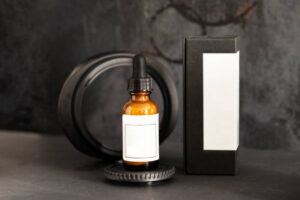Niacinamide, also known as nicotinamide, is a water-soluble form of vitamin B3 (niacin) that offers a wide range of benefits for the skin. It has become a popular skincare ingredient known for its versatility and effectiveness.

Benefits and Uses of niacinamide for the skin:

Niacinamide helps improve the skin’s moisture barrier, reducing water loss and increasing hydration. This makes it suitable for all skin types, including dry and sensitive skin. Niacinamide promotes healthy skin by supporting the natural exfoliation process. It can help smooth rough skin, reduce the appearance of fine lines, and improve overall texture. It has anti-inflammatory properties that can help calm and soothe redness and irritation, making it beneficial for those with sensitive or rosacea-prone skin.
Niacinamide can help reduce the appearance of enlarged pores by regulating sebum production and improving skin elasticity. For those with oily or acne-prone skin, niacinamide can help control excess oil production, leading to a more balanced complexion and fewer breakouts.

Niacinamide can fade dark spots and hyperpigmentation, resulting in a more even skin tone. It inhibits the transfer of melanin to the skin’s surface, reducing the appearance of dark spots and promoting a brighter complexion. Niacinamide strengthens the skin’s natural barrier, making it more resilient and less prone to environmental damage. This can help protect the skin from pollutants and UV radiation. Regular use of niacinamide can stimulate collagen production, helping to reduce the appearance of fine lines and wrinkles.
Read Also: Integrating Acetyl Glucosamine for Optimal Health
Niacinamide can address blotchiness and uneven skin tone, making it an effective ingredient for those with melasma or post-inflammatory hyperpigmentation (PIH). Niacinamide is generally well-tolerated and suitable for all skin types, including sensitive skin. It is less likely to cause irritation compared to some other skincare ingredients. Niacinamide can be used in conjunction with a wide range of skincare ingredients, making it a versatile addition to your skincare routine. In addition to topical products, niacinamide is also available in oral supplements. However, it’s essential to consult with a healthcare professional before takin g niacinamide supplements.
Various forms of Niacinamide used for skin:

Niacinamide serums are popular because they provide a concentrated and lightweight delivery of the ingredient. They are typically applied after cleansing and toning and can be layered under moisturizers or other skincare products.
Creams and lotions containing niacinamide are suitable for those who prefer a richer texture or extra hydration. These products can be applied as part of your daily skincare routine, often as a moisturizer. Some moisturizers are formulated with niacinamide as a key ingredient. These products offer both hydration and the benefits of niacinamide in one step, making them convenient for daily use.
Niacinamide toners can be used to prep the skin before applying other skincare products. They help balance the skin’s pH and provide hydration and niacinamide benefits in one step. Sheet masks or treatment masks infused with niacinamide can provide a boost of hydration and brightening benefits in a single application. These masks are typically used once or twice a week.

Some spot treatments, designed for specific areas of concern like blemishes or dark spots, contain niacinamide to target these issues directly. Sunscreens that incorporate niacinamide offer broad- spectrum sun protection along with the added benefits of niacinamide. They can help protect the skin from UV damage and address skin concerns simultaneously.
Eye creams containing niacinamide are formulated to address specific eye area concerns, such as dark circles, puffiness, and fine lines. These are concentrated niacinamide formulations designed to be added to other skincare products, such as moisturizers or serums, to enhance their benefits. They allow for a customizable skincare routine. Some cleansers include niacinamide as an ingredient to provide a gentle cleansing experience while delivering niacinamide benefits.
Niacinamide isn’t limited to facial skincare. Body lotions containing niacinamide can be used to address concerns such as dryness, uneven skin tone, or rough skin on the body. In some cases, dermatologists may prescribe topical formulations of niacinamide in higher concentrations to address specific skin conditions.
Some precautions and tips for using niacinamide on your skin:

Before applying a new niacinamide product to your face or a larger area of your body, perform a patch test. Apply a small amount of the product to a discreet area, such as the inside of your wrist or behind your ear, and wait for 24 to 48 hours to check for any adverse reactions, including redness, itching, burning, or rash. If you experience irritation, discontinue use. If you’re new to niacinamide or have sensitive skin, consider starting with lower concentrations (around 2% to 5%) and gradually increasing use as your skin becomes accustomed to it. This can help minimize the risk of irritation.
Read Also: Unlocking Kojic Acid’s Power
Niacinamide is generally compatible with most other skincare ingredients, but some combinations may cause skin irritation. Avoid using niacinamide products with ingredients like vitamin C (ascorbic acid) at very low pH levels or alpha hydroxy acids (AHAs) at high concentrations simultaneously, as these combinations can sometimes lead to flushing or irritation. However, many people can use niacinamide and these ingredients together with no issues. If in doubt, consult with a dermatologist. While niacinamide itself is not photosensitizing, it’s still essential to use sunscreen regularly during the day. Sunscreen helps protect your skin from UV damage, which can worsen existing skin concerns.
Niacinamide can support the skin’s natural defense against UV damage. If you have specific skin concerns or conditions, or if you’re considering using niacinamide products with higher concentrations, it’s advisable to consult with a dermatologist or skincare professional. They can provide personalized recommendations and monitor your progress. It can take several weeks to months to see noticeable improvements in your skin when using niacinamide.
Consistency in use is key, so stick with your routine. Always read and follow the manufacturer’s instructions for the specific niacinamide product you are using. Instructions may vary based on the formulation and concentration. Store niacinamide products in a cool, dry place away from direct sunlight to maintain their stability and effectiveness. If you are using other skincare products with active ingredients, such as retinol or exfoliants, be mindful of how niacinamide fits into your overall skincare routine. Some combinations may require staggered application to avoid potential irritation.
Keep in mind that individual skin types and sensitivities vary. While niacinamide is generally well-tolerated, some individuals may still experience sensitivity or allergies. If you experience persistent or severe irritation, discontinue the use of niacinamide products and consult with a dermatologist for guidance.
By following these precautions and using niacinamide products mindfully, you can enjoy the potential benefits of improved skin texture, reduced redness, and a more balanced complexion while minimizing the risk of adverse reactions or irritation.
